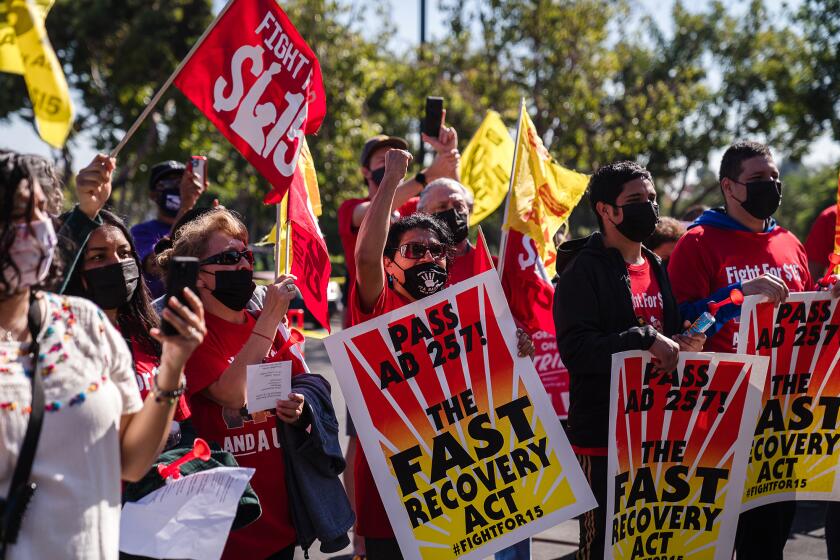California Legislature passes bill to protect fast-food workers

Under the Fast Food Recovery Act, a council would be authorized to set the minimum wage and regulate working conditions for fast-food workers.
- Share via
A California bill that aims to improve and standardize working conditions for fast-food workers will head to the desk of Gov. Gavin Newsom after winning passage in the state Senate and Assembly on Monday over objections from business interests, which say it unfairly targets the fast-food industry and will drive up food prices.
The centerpiece of Assembly Bill 257, dubbed the Fast Food Recovery Act, is the creation of a state Fast Food Council with the authority to establish standards for wages, working hours and conditions. The council would set aside seats for business and worker representatives.
“We’re looking to give workers a voice on the job, and for workers in the fast-food industry, which will continue to try to organize, it’s tough,” said former legislator Lorena Gonzalez, the original author of the bill, who is no longer in the Assembly. “They’ve never had a voice on the job, and traditional organizing hasn’t worked.”
The bill fell two votes short in the Assembly in the previous legislative session but passed in January this year after being reintroduced by Assemblyman Chris Holden (D-Pasadena). It returned to the Assembly on Monday for another vote because of several amendments made while in the Senate to alleviate the concerns of some lawmakers.
Newsom has not stated a position on the bill, but his Department of Finance released an analysis in June opposing the measure, saying it would create “significant ongoing costs” at the Department of Industrial Relations and a “fragmented regulatory and legal environment” for employers.
Fast-food workers are walking off the job in support of a California bill that would establish a council to negotiate standards on wages, hours and other work conditions.
One major change was the removal of a joint liability clause that would have made a corporate franchiser responsible for labor law violations of its franchisees, a provision that opponents of the measure argued would greatly discourage franchising in the state.
Another reduces the size of the governing council and the number of seats allocated to state regulators, originally seven of 13 spots. The revised 10-person council includes four seats held by fast-food franchiser and franchisee representatives and four seats held by fast-food worker representatives and advocates.
The last two seats are for representatives of the Department of Industrial Relations and the Governor’s Office of Business and Economic Development, both of which would be gubernatorial appointees.
“What we have is a council that gives voice, which is what the labor code is all about,” said state Sen. Bob Hertzberg (D-Van Nuys), holding a copy of the labor code, ahead of the vote. “I think that a fair balance has been reached.”
The bill establishes that legislators will have sufficient time to review and potentially block any standards set by the council, and the council has a sunset in six years, allowing legislators to evaluate its effectiveness.
The new version of the bill also limits the minimum wage from rising above $22 an hour in 2023.
The legislation has been heavily opposed by the California Restaurant Assn., International Franchise Assn. and California Chamber of Commerce, which together sponsored the Stop AB 257 campaign.
The U.S. Black Chambers, National Asian/Pacific Islander American Chamber of Commerce and Entrepreneurship, and National LGBT Chamber of Commerce addressed a joint letter to legislators Monday urging them to vote no on the bill.
Jot Condie, president of the CRA, said the amendments don’t change the fact that the legislation still creates a council with rule-making authority that bypasses the Legislature.
“You can shift the council around, but it doesn’t change the fact that they are handing the keys to an unaccountable council to do fundamental work,” Condie said. “Fundamental matters in workplace policy should be considered and dealt with by elected officials.”
Condie pointed to California labor law enforcement data that show fast-food restaurants account for only 1.6% of labor violations across all sectors and the sector is one of the “better performers in compliance.”
If the council chose to raise the minimum wage to $22 an hour, it would lead to a 20% increase in restaurant food prices, the bill’s opponents say, citing a report from the UC Riverside School of Business’ Center for Economic Forecasting and Development.
Blair Salisbury, owner of an El Cholo in Pasadena and former president of CRA’s Los Angeles chapter, said he was planning on franchising a local restaurant called Daddy’s Chicken Shack when AB 257 gave him pause.
“It just gave me very cold feet,” he said. Under the 20-restaurant agreement he entered into, he will open one location himself and must find 19 other people to open franchises in five years. He believes AB 257 will make it more difficult to find franchisees.
Salisbury also believes increases in minimum wage will lead to restaurants cutting their labor force and finding ways to automate their operations wherever possible. In his restaurant, Salisbury had to eliminate three prep cooks because of increases in the minimum wage, he said.
Ahead of the vote, Republican lawmakers vehemently criticized the legislation, saying it did not address enforcement of existing labor law and gave “unchecked authority to an unelected council.”
The Fast Recovery Act heading for a vote in the California Senate would remake the franchise industry for the better.
Fast-food workers across California have rallied in support of the bill, especially in light of the COVID-19 pandemic, which has given service industry workers new frustration and visibility as they continue to operate in grueling, sometimes hazardous conditions.
A study by the UCLA and UC Berkeley labor centers found almost two-thirds of fast-food workers have experienced wage theft, and more than half have faced health and safety hazards on the job. Of the workers who raised concerns with their employers, about a third reported that their employer did nothing to resolve the issue, while 25% experienced retaliation, the study found.
“We’re not trying to tell these franchisees and corporations how to run their business. We just want them to listen to some of our ideas, that’s it,” said Anneisha Williams, who works part time at a Jack in the Box at Slauson and Arlington avenues in South Los Angeles.
Williams, 37, filed a labor complaint in June alleging Jack in the Box did not adequately pay her when she had to stay home to take care of her son, who was required to quarantine because of COVID exposure for periods of January and February of this year, according to the complaint.
Williams said that when she asked her store manager about COVID pay, he told her she was not entitled to it since she herself had not tested positive.
“We shouldn’t have to struggle so much,” Williams said. “We want to be treated like we’re actually human beings.”
Sectoral bargaining, in which unions negotiate for workers across an entire industry, is common in Europe. Though not exactly the same, the council established by AB 257 would be the first sectoral council of its kind in the U.S., to Gonzalez’s knowledge.
David Madland, a senior fellow at the Center for American Progress, a progressive think tank, called the legislation the “most important pro-worker bill in decades” in a post-vote news conference.
The sectoral approach “empowers workers, creates a forum for all stakeholders to come together and raises standards across a whole industry,” he said.
Mary Kay Henry, president of the Service Employees International Union, said she was confident that Newsom would sign the bill into law.
Gonzalez said she believes the amendments have addressed many of the concerns lawmakers and business interests had with the initial iteration of the bill.
“Now it’s simply do you believe that workers should have a voice at the table, bring up issues and set standards around the workplace?” Gonzalez said. “That’s all.”
More to Read
Inside the business of entertainment
The Wide Shot brings you news, analysis and insights on everything from streaming wars to production — and what it all means for the future.
You may occasionally receive promotional content from the Los Angeles Times.













